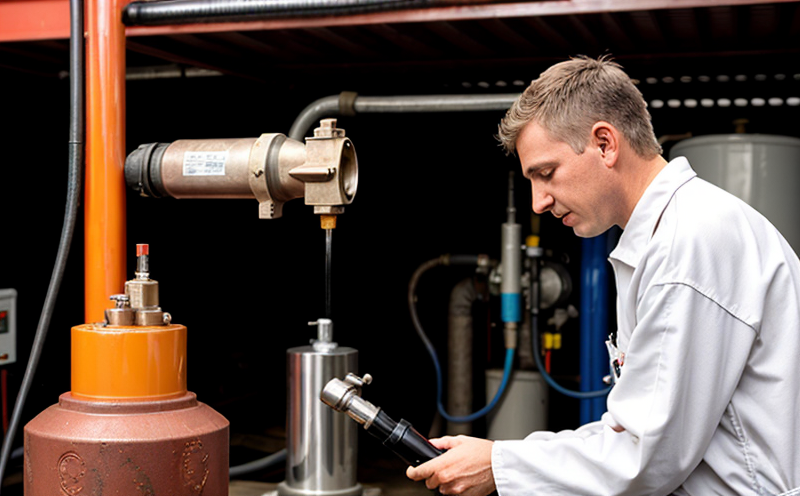ASTM D2425 Hydrocarbon Type Analysis by Mass Spectrometry
The ASTM D2425 method is a critical analytical technique used to determine the hydrocarbon type in aviation fuel and lubricants. This test evaluates the presence of different types of hydrocarbons, which are essential for ensuring fuel and lubricant quality and compatibility with engines and equipment. The primary goal is to identify any contamination or degradation that could impact performance, efficiency, and safety.
The process involves several key steps. First, a sample of the fuel or lubricant is prepared according to ASTM D2425 specifications. This typically includes diluting the sample in a solvent compatible with mass spectrometry analysis. The sample is then introduced into the mass spectrometer where it undergoes ionization and fragmentation based on its molecular weight and charge.
The resulting ions are detected and analyzed by mass-to-charge ratio, allowing for detailed identification of various hydrocarbon components. This method provides a high-resolution spectrum that can differentiate between different types of hydrocarbons such as alkanes, aromatics, cycloalkanes, and olefins. The data obtained is compared against established reference materials to ensure accuracy.
The significance of this test lies in its ability to detect even trace amounts of contaminants or impurities that could lead to engine failure or reduced performance over time. For instance, the presence of aromatic hydrocarbons may indicate fuel degradation or contamination, while excessive olefins can suggest poor storage conditions or improper handling.
Accurate hydrocarbon typing is crucial for maintaining regulatory compliance and ensuring product quality in aerospace and aviation industries. It helps manufacturers and suppliers meet stringent international standards such as ASTM D910, ISO 5162, and EN 14214. By adhering to these guidelines, companies can demonstrate their commitment to producing reliable and safe products.
Furthermore, regular testing using ASTM D2425 ensures consistent performance across batches of fuel or lubricant, thereby minimizing variability in operational conditions. This consistency is vital for optimizing engine efficiency and extending component life. In addition, it supports the development of new formulations that meet evolving industry demands.
- Customer Impact: Improved product quality leads to enhanced customer satisfaction through reliable performance and reduced maintenance costs.
- Safety: Detecting contaminants early prevents potential accidents or malfunctions in critical applications like aviation fuels.
- Economic Benefits: Consistent product quality reduces waste, improves production efficiency, and enhances brand reputation.
In conclusion, ASTM D2425 hydrocarbon type analysis by mass spectrometry is an indispensable tool for ensuring the highest standards of fuel and lubricant quality. By leveraging this technology, laboratories can provide accurate, reliable data that contribute to safer operations and more efficient processes in aerospace and aviation sectors.
Why It Matters
The importance of ASTM D2425 hydrocarbon type analysis cannot be overstated, particularly within the aerospace and aviation industries where precision and reliability are paramount. Ensuring that fuels and lubricants meet specific chemical compositions helps prevent issues such as engine malfunctions or failures due to improper lubrication.
One key aspect is preventing contamination from harmful substances like water or particulates which can degrade fuel quality over time. By identifying these contaminants early, operators have the opportunity to address problems before they become significant issues. Additionally, understanding the specific types of hydrocarbons present allows for better formulation adjustments and process improvements.
From a regulatory standpoint, compliance with standards such as ASTM D910 ensures that all products meet safety requirements set forth by governing bodies worldwide. This not only protects end users but also fosters trust among customers who rely on consistent performance from their suppliers.
In summary, accurate hydrocarbon typing supports both operational excellence and adherence to global regulations, making it an essential service for any organization involved in aviation or aerospace testing.
Industry Applications
The ASTM D2425 method finds extensive application across various segments of the aerospace and aviation industries. Here are some key areas where this analysis plays a crucial role:
- Aircraft Engine Testing: Ensuring that fuels used in aircraft engines meet the required specifications is vital for maintaining optimal performance and safety.
- Lubricant Quality Control: Evaluating lubricants helps identify any potential issues that could affect moving parts within aircraft components.
- Petroleum Refining: Refineries benefit from this analysis by optimizing production processes and improving product quality.
- Aerospace Research & Development (R&D): Researchers use ASTM D2425 to study the effects of different hydrocarbons on engine performance under varied conditions.
In each case, the primary objective remains consistent – ensuring that fuels and lubricants perform optimally throughout their lifecycle. Through meticulous testing and analysis, laboratories can provide actionable insights that drive continuous improvement in these vital sectors.





